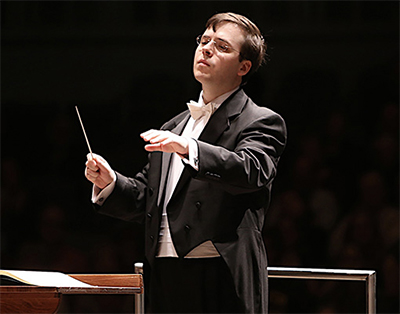by Nicholas Stevens

Many among the group that took the dais at West Shore Unitarian Universalist Church on Monday, November 19 play in The Cleveland Orchestra. However, these musicians’ professional affiliations also include distinguished ensembles and schools across Ohio and Pennsylvania. So attractive was their collective star power that the Church’s pews proved insufficient to the task of seating the large audience. Many stood, or sat outside in a hallway — a situation that the Society might easily have remedied during the lengthy opening remarks.
Cellist Charles Bernard and double bassist Mark Atherton joined the winds for Dvořák’s Serenade, adding the muscle of lower strings while blending seamlessly into group textures. Bassoonists Barrick Stees and Jonathan Sherwin sounded strong and distinctly reedy as the foundation of the winds. Feddeck excelled in moments of transition and closure, as in the second movement when the tempo shifts without warning. He also sublimely balanced the first of many final chords here, allowing the ensemble to sound both earthy and transcendent.
First horn Richard King floated through beautifully shaped melodic lines and carried off high passages with ease, while second and third horns Meghan Guegold and David Brockett achieved velvety tone in low moments. More calligraphy than semaphore, Feddeck’s conducting only became grandiose or dancelike in preparation for major changes in mood. Oboists Jeffrey Rathbun and Corbin Stair worked overtime as the high voices of the ensemble, as did clarinetists Daniel McKelway and Benjamin Freimuth. The finale took listeners on a speed-hike through the sunny forests of some idyllic Czech mountainside, colors bursting from the ensemble at the brilliant conclusion.
Flutists, violists, and additional bassists and cellists joined this contingent for Brahms’ Serenade No. 2, which sounded somewhat reserved in comparison with the Dvořák despite excellent playing by all involved. Early highlights included a moment of melodic unfolding over a heartbeat-like bass in the first movement, and the glowing final minute of the second. The third, with its dark textures and occasional acrid harmonies, gave the impression of a rich chocolate torte subtly laced with poison. Playful and breezy by turns, the fourth finds Brahms offering multiple possible endings, all but one of which fail to materialize. Sally Sherwin was outstanding on piccolo in the fifth movement, an archetypal sweeping finale. With a final, triumphant gesture, Feddeck brought the auspicious evening to an end.
Published on ClevelandClassical.com December 3, 2018.
Click here for a printable copy of this article


